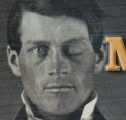After we identified the subject of our daguerreotype
as Phineas Gage we were asked if we believed that it is the only
surviving portrait of Gage. We have always said that it is very likely
that other photographs were made and it is possible that they have
survived in the possession of collectors who, like us, did not know
that the portrait was of Phineas. We were partially correct.
Within weeks of the July 2009 announcement of our identification
we learned that a descendent of Phineas Gage's brother had
emailed Malcolm Macmillian a scan of a paper photograph that had
come down
in her
family. It was clearly a photograph of Phineas in a different pose
and, we feel confident, taken at a different time and by a different
photographer. We were excited to learn that Tara Gage Miller who
owned the photograph lived in Texas. We were about to leave for
a visit to Texas and were able to meet with her and examine the
photograph. We found her very helpful and open to sharing information
about her family and the photograph. From our study of the image
we felt it was a recent copy of an albumen
print,
likely
a cabinet
card,
that
was
a copy
of an original daguerreotype. We were correct
since Tara has since received
the actual cabinet card from a member of her family. With her permission
we post it here. The fact that it is a mirror image tells us that
the original was a daguerreotype. It seems that the original daguerreotype
has been lost but perhaps it still exists and will someday surface.
After the publication of an article about our daguerreotype in
the January Smithsonian Magazine a descendent of another branch
of the Gage family sent a scan of a trimmed cabinet card that came
down in her family. The image is the same as Tara's on a different
mount and it appears that this copy was made in the 1880s or 90s.
The owner
of this
photograph wrote to "correct" the
Smithsonian for printing the image of our daguerreotype backwards.
This has been mentioned elsewhere on the internet and in letters
to the magazine although the article states in a caption that the
decision was to show Gage as he appeared in life since the daguerreotype
is a mirror image.
We were wrong in one of the assumptions we made about further
discoveries. Both of the families who owned the newly published
photograph knew that the photograph was of Phineas Gage. To them
he was an interesting family member but they did not think that
the world at large would be especially interested in him.
|
|

This is a cabinet card owned by the family of Tara
Gage Miller. We show it as the card appears. Here it seems that
the right eye is closed since it is a faithful copy of an earlier
daguerreotype
which was a mirror image.
Phineas wears the same waistcoat as in our photograph.
but the shirt and tie are
different
and it is not
possible to tell
if the
jacket
is the
same. The pose is more casual than in our photograph.
Below is a detail from the cabinet card on the left
and the daguerreotype on the right. The cabinet card copy is not
as sharp as the daguerreotype but the flower clusters appear in
the same position on both lapels.

Cabinet cards, 4 1/4" by 6 1/2" were introduced
in the 1860s and became the dominate style of photographs from
the 1870s thought the 1890s.
Thanks to Tara Gage Miller for allowing us to post
her family cabinet card.
|

